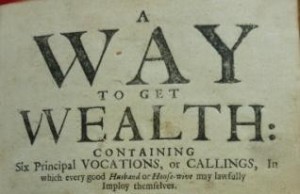February 24, 2012, by C Fawcett
Pills and potions in the archives
How did our ancestors cope with ill-health, before the days of ready-prepared packets from the local shop? In working with the archives and early publications in the University’s collections, I’ve been taken by the number and variety of herbal remedies that sit alongside culinary recipes in early household books. The ingredients are sometimes exotic and the claims ambitious, but the aches and pains and symptoms of illness are often the familiar ones which today take us to the shelves of our local pharmacy.
For a dry cough
Take of clean wheat, & of clean barley, of each a like quantity, and put them into a gallon & a half of fair water, and boyl them till they burst, then strain it into a clean vessel, and adde thereto a quarten of fine Lycoras powder, and two pennyworth of gumme Arabick, then boyl it over again, and strain it, and keep it in a sweet vessel, and drink thereof morning and evening.
Markham came originally from Cotham, Nottinghamshire and it was another Nottinghamshire man who in the late 19th century commercialised the supply of herbal remedies. For Jesse Boot, known to history as the founder of the Boots company, began his business career in the small herbalist shop established by his father John in Nottingham in 1849.
Collections at the University that include other recipes and accounts of early health care can be accessed through the online catalogues and consulted at the King’s Meadow reading room of Manuscripts and Special Collections.
No comments yet, fill out a comment to be the first



Leave a Reply